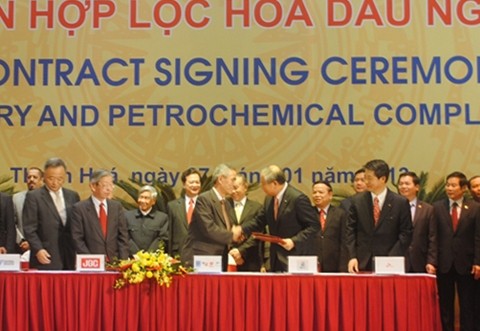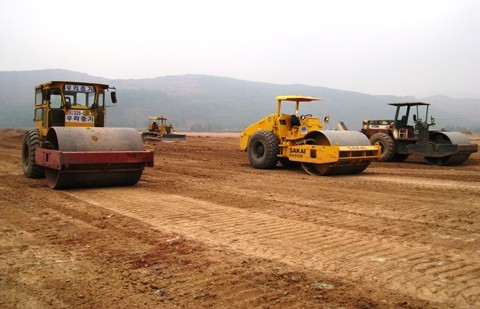
Prime Minister Nguyen Tan Dung attended the signing ceremony in Thanh Hoa today.
Nghi Son Oil Refinery is the first joint venture of Vietnam National Oil and Gas Group (PetroVietnam), Kuwait Petroleum International, and Japan’s Idemitsu Kosan Company and Mitsui Chemicals Company. Nghi Son Oil Refinery has a designed capacity of 200,000 barrels a day. When it’s completed in 2017, together with Dung Quat Oil refinery, it will meet 70% of Vietnam’s oil and gas needs and supply petrochemical products for the domestic and export market. Korumuri Shimmura, General Director of Nghi Son Oil Refinery, says:
“The project is the largest development investment in Vietnam to date. Therefore, the success of this project is the key to attract further foreign investment into Vietnam. The project contributes to ensuring national energy security for the nation, particularly the security of petroleum products, and the implementation of a strategy to develop the infrastructure of the oil and petroleum sector and support industries. Through this project, investors from Japan and Kuwait can further expand business opportunities in Vietnam.”
Nguyen Dinh Xung, Vice Chairman of Thanh Hoa’s People’s Committee, said about 4 billion USD will be invested in Nghi Son Economic Zone in the near future. But the province plans to launch key economic projects that can tap local advantages and contribute to the local economic restructuring while increasing export revenues and generating more jobs. Xung explains:
“Both the provincial Party Committee and People’s Committee aim to speed up the preparations for signing investment and cooperation documents and memorandums of understanding on investment. We want to focus on procedures to quickly hand over investment certificates for domestic and foreign investors. Key projects include Nghi Son Thermo-electric Plant No2, investment in infrastructure at Lam Son-Sao Vang Industrial Park, and the Nghi Son port cluster.”
Tran Hoa, head of Nghi Son Economic Zone’s management board, says the zone has many advantages to attract investment thanks to its geographical location on the North-South traffic axis. He says:
“Recently, the Government and the Ministry of Planning and Investment have allowed the zone to be expanded to cover an area of 45,000 ha and a number of projects will be added in the clean industry, the high-tech agricultural industry, and support industries for the Nghi Son oil refinery and petrochemical complex. The zone is improving the investment environment and helping investors deal with administrative reforms and land clearance.”

Land clearance is underway to expand Nghi Son Economic Zone.
Nguyen Van Trung, Deputy Minister of Planning and Investment, comments:
“Key projects like the Nghi Son Oil Refinery are having a positive influence on the region and the country as a whole. Thanh Hoa is attracting investors in line with the country’s guidelines and policies on investment attraction. These are Japanese businesses from whom we can learn valuable technology and management lessons.”
When its first phase is put into operation in the first quarter of 2017, the refinery’s capacity is planned to reach 10 million tons of crude oil a year and 20 million tons in the second phase.